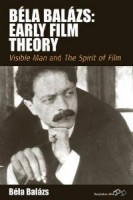categories
- Traffic and Vehicles Catalogue
- socreal.catalog
- Advertisement Catalogue
- Photo Catalogue
- Chinese and Japanese Catalogue
- New Holy Card Catalogue II.
- 12 interesting old books
 Books
Books
 Bibliophil
Bibliophil
 Antiques
Antiques
 Engraving
Engraving
 Maps
Maps
 Photos
Photos
 Antique Papers, Small Prints
Antique Papers, Small Prints
 Posters
Posters
- Circus
- Modern Graphics
- Socialist Realism
- NER Propaganda
- Others
cart
Cart is empty
You've not logged in
Balázs Béla : Earley Film Theory
- description
- additional information
Visible Man and The Spirit of the Film
[The book is] part of the Film Europa: German Cinema in an International Context series. [It] has an attractive typeface and a well-designed layout. In addition to Carter's introduction there is also a useful Glossary of terms and an Appendix with two reviews... In all, this book is a very good introduction to Balázs' film philosophy and a long overdue entry into the English-speaking world of film literature. · Screening the Past An exemplary book in every way, this translation makes Balázs' revolutionary texts available in English for the first time ... Dating from 1924 and 1930 respectively, The Visible Man and The Spirit of Film had a decisive influence on such major Russian filmmakers as Vsevolod Pudovkin and Sergei Eisenstein, and were among the first studies to examine filmic syntax, grammar, and editorial structure. Including a detailed introduction and numerous illustrations, this volume is a must for anyone serious about film ... Highly recommended. · Choice Béla Balázs's two works, Visible Man (1924) and The Spirit of Film (1930), are published here for the first time in full English translation. The essays offer the reader an insight into the work of a film theorist whose German-language publications have been hitherto unavailable to the film studies audience in the English-speaking world. Balázs's detailed analyses of the close-up, the shot and montage are illuminating both as applicable models for film analysis, and as historical documents of his key contribution - such contemporaries as Arnheim, Kracauer and Benjamin - to critical debate on film in the 'golden age' of the Weimar silents.
[The book is] part of the Film Europa: German Cinema in an International Context series. [It] has an attractive typeface and a well-designed layout. In addition to Carter's introduction there is also a useful Glossary of terms and an Appendix with two reviews... In all, this book is a very good introduction to Balázs' film philosophy and a long overdue entry into the English-speaking world of film literature. · Screening the Past An exemplary book in every way, this translation makes Balázs' revolutionary texts available in English for the first time ... Dating from 1924 and 1930 respectively, The Visible Man and The Spirit of Film had a decisive influence on such major Russian filmmakers as Vsevolod Pudovkin and Sergei Eisenstein, and were among the first studies to examine filmic syntax, grammar, and editorial structure. Including a detailed introduction and numerous illustrations, this volume is a must for anyone serious about film ... Highly recommended. · Choice Béla Balázs's two works, Visible Man (1924) and The Spirit of Film (1930), are published here for the first time in full English translation. The essays offer the reader an insight into the work of a film theorist whose German-language publications have been hitherto unavailable to the film studies audience in the English-speaking world. Balázs's detailed analyses of the close-up, the shot and montage are illuminating both as applicable models for film analysis, and as historical documents of his key contribution - such contemporaries as Arnheim, Kracauer and Benjamin - to critical debate on film in the 'golden age' of the Weimar silents.
| condition: |      |
| category: | Books > Foreign Language Books > Books in English > |
| category: | Books > Arts > Movies, Theater > |
| publisher: | Berghahn Books, 2010 |
| item number / ISBN: | 9780857453556 |
| binding: | paperback |
| pages: | 258 |
| language: | English |

























































 Telefon:
Telefon: E-mail:
E-mail:







